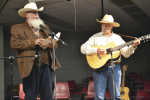After 20 years, it's the end of the trail

This year when Echoes of the Trail co-founders Arnold Schofield and Johnny Kendrick take the stage to perform the event's theme song, they might feel a little melancholy.
This is the 20th and final year of the Echoes of the Trail Cowboy Gathering in Fort Scott.
"This journey we started, it's hard to believe it's been 20 years," Arnold Schofield, Echoes co-founder, said.
Echoes of the Trail will take place Friday and Saturday at Fort Scott Community College.
Kendrick and Schofield used to meet for lunch on occasion, and during one of these lunches in early 1996, Kendrick told Schofield about a cowboy poetry festival he had attended in Northern Missouri. Seeing how much he enjoyed it, Schofield said, "Well, let's have one here," and four months later, in June 1996, the first Echoes of the Trail Cowboy Gathering was held.
"I told Laura Meeks, who was the president of FSCC at the time, about the idea, and she really loved it, and invited us to have it there," Schofield said. "After the first gathering, which was maybe 100 people, we decided we would need more help. So Laura was nice enough to give us Judy Howser, and she's really been responsible for keeping this thing alive and current."
Howser is the publicity chairman for the group.
Kendrick knew who to invite, since he'd been going to cowboy poetry festivals for quite some time, and is an accomplished western/bluegrass singer himself. He said cowboy poetry is older than people may realize.
"It goes all the way back to the Victorian age," Kendrick said.
He credits John Lomax, an honorary consultant and curator of the archive of American Folk Song (now the American Folklife Center archive) with documenting much of the old cowboy songs and poetry we know today.
Lomax and his wife, Ruby, began a three-month, 6,502 mile trip through the southern United States, beginning in Port Aransas, Texas, on March 31,1939, and ending at the Library of Congress on June 14, 1939.
Lomax and his wife recorded approximately 25 hours of folk music from more than 300 performers. These recordings represent a broad spectrum of traditional musical styles including ballads, blues, children's songs, cowboy songs, fiddle tunes, field hollers, lullabies, play-party songs, religious dramas, spirituals, and work songs.
